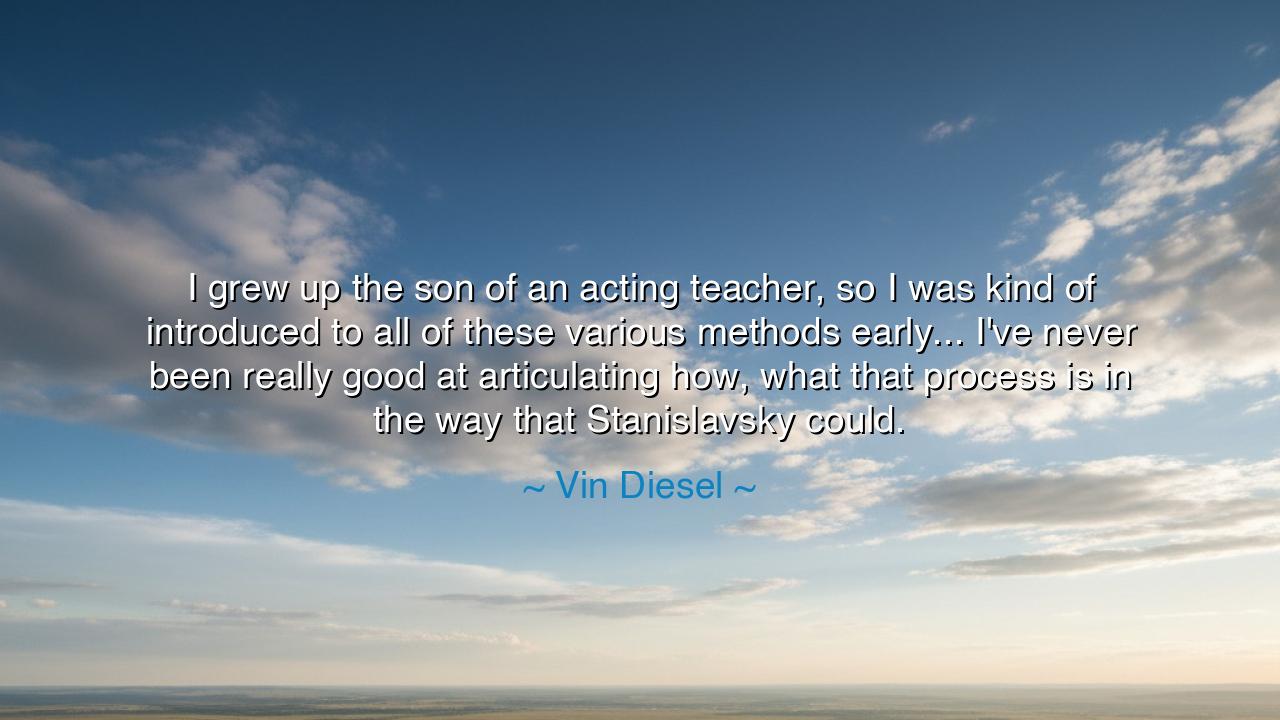
I grew up the son of an acting teacher, so I was kind of
I grew up the son of an acting teacher, so I was kind of introduced to all of these various methods early... I've never been really good at articulating how, what that process is in the way that Stanislavsky could.






Hear the words of Vin Diesel, spoken with humility and remembrance: “I grew up the son of an acting teacher, so I was introduced to all of these various methods early... I’ve never been really good at articulating what that process is in the way that Stanislavsky could.” These words, though modest, reveal a profound truth about the nature of art, learning, and the mystery of expression. For they speak not only of acting, but of the eternal struggle between practice and explanation, between lived truth and spoken theory.
The meaning is this: art is born not only of study, but of immersion. Diesel was raised in the household of an acting teacher, where the language of theater and the discipline of performance were as natural as bread and water. He absorbed the methods—those sacred techniques by which actors reach into themselves and draw forth truth—but he admits that the mystery of the process is not easily spoken. For art is like the wind: you can feel its touch, but to capture it in words is nearly impossible.
Here he invokes the name of Stanislavsky, the great Russian master who sought to codify the soul of acting, to make its mysteries into a method that could be taught across the world. And indeed, Stanislavsky’s system became the root of countless schools of performance, influencing actors for generations. Yet even he confessed that the actor’s art is never fully imprisoned in theory, for it belongs to the realm of spirit as much as technique. Thus, Diesel stands in the line of truth: that the process of art is best known by doing, by living, by breathing, rather than by endless explanation.
Consider the story of Michelangelo, who when asked how he carved David, replied simply: “I saw the angel in the marble, and I carved until I set him free.” Could he explain the process by which his eye discerned form within stone? Perhaps not. Yet the statue stands immortal, greater than any theory. So it is with acting: the actor may not be able to describe every step of the method, yet the truth of their work resounds on the stage and screen, felt deeply by those who watch.
The lesson is also one of humility. Diesel does not claim mastery of articulation, nor the elegance of Stanislavsky, but he acknowledges the power of inheritance—being raised by a teacher, absorbing wisdom through daily life, and letting the art shape him in silence. This humility is itself a form of greatness, for it reminds us that the value of art lies not in the perfection of theory but in the authenticity of practice. The truest measure is not how well one can describe their path, but how deeply their path touches others.
From this we learn that there are two ways of knowing: the knowledge of the mind, which seeks to explain, and the knowledge of the heart, which simply acts. Both are sacred. Some are called to articulate, like Stanislavsky, shaping systems for future generations. Others are called to embody, like Diesel, whose presence on the screen speaks louder than his words about his process ever could. Each path has its place, and together they reveal the fullness of human creativity.
Practical steps follow from this teaching. If you are an artist, do not despair if you cannot perfectly describe your method. Pour your energy into your craft, and let your work speak for itself. If you are a teacher, strive to articulate—but remember that what matters most is not theory alone, but the living fire that students carry forth. And for all, honor the inheritance you have received—whether from family, mentor, or tradition—for it is this legacy that plants the seeds of greatness in your soul.
So let Vin Diesel’s words be remembered: “I grew up the son of an acting teacher, introduced to many methods, though I cannot explain the process as Stanislavsky could.” In this we see that art is both gift and mystery, both discipline and grace. Some will give it language, others will give it life. And it is through both that the eternal fire of creativity endures, passed down through generations, ever burning, ever new.






AAdministratorAdministrator
Welcome, honored guests. Please leave a comment, we will respond soon